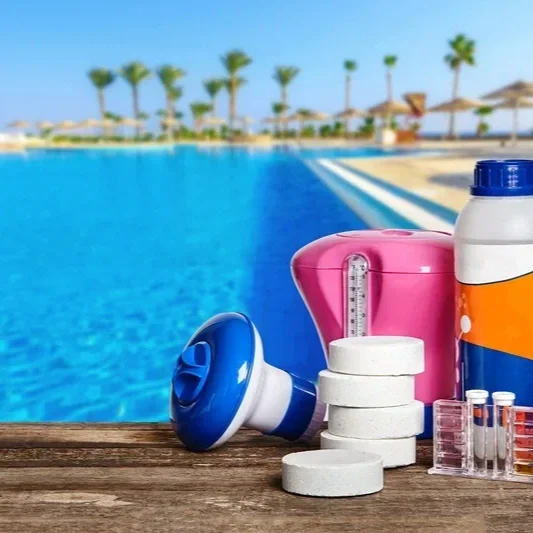Essential Pool Maintenance Tasks That Are Often Overlooked
Good maintenance not only protects your investment but also provides a consistently pleasant swimming experience for family and friends.
Maintaining a pool involves more than just skimming the surface for leaves or balancing basic chemicals like chlorine and pH levels. While these tasks are important, several other essential duties are often overlooked, leading to cloudy water, strained equipment, or costly repairs.
Incorporating these tasks into your routine guarantees that your pool remains clean, safe, and enjoyable throughout the entire season. Good maintenance not only protects your investment but also provides a consistently pleasant swimming experience for family and friends.
Regular Filter Cleaning
Your pool’s filter acts as its “kidney,” removing impurities and keeping the water clear. Over time, filters can become clogged with leaves, dirt, sunscreen residues, and other debris, reducing efficiency and putting extra strain on the pump. Neglecting filter maintenance can generate cloudy water, increased chemical use, and potential damage to the filtration system.
Different types of filters require different cleaning methods:
Sand filters should be backwashed regularly to flush out trapped debris.
Cartridge filters require rinsing and occasional soaking in cleaning solutions to remove oils and buildup.
DE (diatomaceous earth) filters must be inspected for cracks in grids and periodically replaced with fresh DE powder.
Maintaining a clean filter secures optimal water clarity, reduces strain on equipment, and extends the life of your filtration system.
Inspecting for Leaks
Even minor leaks can escalate into significant problems. Water loss can increase chemical usage, lead to higher utility costs, and compromise the pool’s structure. Regularly inspect your pool shell, plumbing, and equipment for leaks.
Signs to watch for include:
Unexplained drops in water level.
Damp or wet areas around pumps, skimmers, or pipes.
Visible cracks, corrosion, or unusual water pooling.
Early detection enables timely repairs, preventing more extensive damage and maintaining the health of your pool. Professional inspections can also detect hidden leaks that might go unnoticed, such as small cracks in liners or fittings.
Maintaining Pool Covers
Pool covers serve multiple purposes: they keep debris out, retain heat, and reduce water evaporation. However, a neglected cover can become a breeding ground for algae, mold, or even pests. Regular maintenance includes:
Removing leaves, dirt, and standing water.
Inspecting for tears, fraying, or damage.
Cleaning with appropriate solutions to prevent buildup.
A well-maintained cover not only maximizes effectiveness but also prolongs its lifespan, protecting your pool investment.
Testing Calcium Hardness
While pH and chlorine levels often receive the most attention, calcium hardness is equally crucial for pool longevity. Low calcium levels can corrode metal equipment and damage pool surfaces, while high calcium levels lead to scaling and rough textures.
Routine testing and adjustments help:
Protect pool surfaces from deterioration.
Guarantee swimmers experience smooth, comfortable water.
Prevent costly repairs caused by scaling or corrosion.
Maintaining proper calcium hardness is particularly important for pools with plaster, concrete, or tile finishes.
Cleaning Skimmer Baskets
Skimmer baskets trap leaves, insects, and debris before they reach the filter. When clogged, water flow is restricted, reducing filtration efficiency and placing additional strain on the pump.
Best practices include:
Emptying skimmer baskets weekly.
Rinsing baskets to remove fine debris.
Checking for cracks or damage that could let debris bypass the skimmer.
Consistent skimmer maintenance helps maintain proper circulation and protects the longevity of pumps and filters.
Checking Equipment for Wear
Pool equipment—including pumps, heaters, and chlorinators—experiences regular stress and can develop wear over time. Routine inspections help catch minor issues before they escalate into major problems.
Look for:
Worn seals or gaskets.
Rust or corrosion on metal components.
Loose fittings, hoses, or electrical connections.
Addressing these concerns early can prevent unexpected breakdowns and extend the life of expensive pool systems.
Addressing Early Algae Growth
Algae can start as small spots on walls, steps, or in shaded areas and spread rapidly if left unaddressed. Even a minor outbreak can affect water clarity, chemical balance, and swimmer comfort.
Preventive measures include:
Regular brushing of pool walls, floors, and steps.
Maintaining proper sanitizer and chlorine levels.
Paying special attention to corners, behind ladders, and around water features.
Early detection and treatment prevent algae from taking hold, keeping water crystal clear and safe for swimming.
Periodic Draining and Refilling
Over time, dissolved solids—minerals, salts, and chemical residues—accumulate in pool water. High levels of these solids can make chemical balancing more difficult and reduce the effectiveness of sanitizers.
Partially draining and refilling the pool:
Refreshes the water.
Helps maintain chemical balance.
Supports a healthier swimming environment.
Even partial water replacement can have significant benefits for long-term pool maintenance.
Winterization and Off-Season Care
For seasonal pool owners, proper winterization is often overlooked but essential. Draining water from equipment, adding antifreeze to pipes, and covering the pool properly prevent freeze damage and equipment deterioration. Off-season maintenance also reduces cleaning effort in the spring and preserves the longevity of pool components.
Conclusion
By paying attention to these often-overlooked tasks, pool owners can maintain a sparkling, safe, and enjoyable swimming environment year-round. Consistent care—including filter cleaning, leak inspections, skimmer maintenance, and early algae control—not only enhances the swimming experience but also protects the life of your pool and equipment.
Treating your pool like a long-term investment ensures it remains an attractive, functional, and relaxing feature of your home. Proper maintenance minimizes repair costs, preserves water quality, and provides crystal-clear enjoyment for years to come. Whether you handle tasks yourself or partner with professional pool service providers, staying proactive is the key to a healthy, beautiful pool.

